This post is the ninth and final post in our series about myFutureNC’s Bite-Sized Webinars. Previous posts covered Family-Sustaining Wages, Labor Market Alignment, FAFSA and Financial Aid, NC Pre-K, Opportunities for Growth, Opportunity Youth, Career and College Promise (CCP), and Career and Technical Education (CTE).
Industry-Valued Credentials Are Valuable
The ninth and final webinar in the Bite-Sized Webinar series from myFutureNC focused on the topic of industry-valued credentials. In this post we will be summarizing the webinar and also exploring our region’s industry-valued credential attainment data using the attainment profile for the Land of Sky region and for the four individual counties in our region: Buncombe, Henderson, Madison, and Transylvania. This webinar included an explanation of the NC Workforce Credentials list and categories and then featured both a K-12 school district and a community college that presented on promising practices to increase student participation in and completion of industry-valued credentials.
Brett Brenton, the Regional Impact Manager for the North Central Region for myFutureNC, facilitated this Bite-Sized Webinar on May 28, 2024. Mr. Brenton highlighted the Access to Postsecondary Credits box in the Academic Readiness section at the bottom of the attainment profile and called out the statistics for industry-valued credential completion: students in North Carolina completed 325,307 Career and Technical Education (CTE) credentials, of which 65,583 (20%) were industry-valued credentials.
According to the 2024 attainment profile for the Land of Sky region (relevant section shown below with the industry-valued credential data outlined in red), students in the Land of Sky region completed 6,109 Career and Technical Education (CTE) credentials, of which 1,650 (27%) were industry-valued credentials.
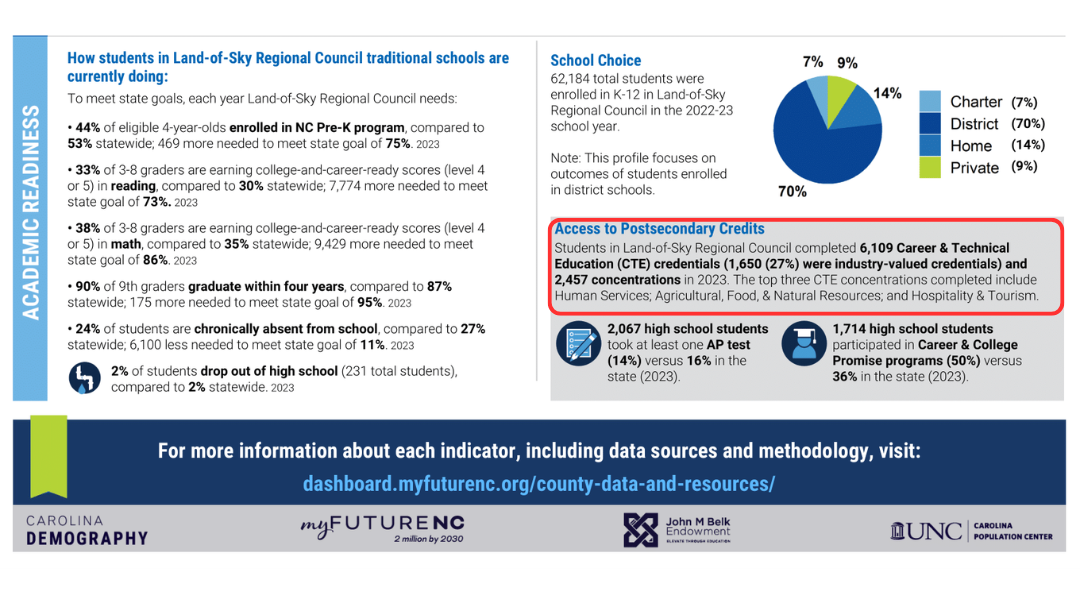
What Are Industry-Valued Credentials?
Mr. Brenton defined industry-valued credentials and explained the system developed in North Carolina to identify and classify them. Industry-valued credentials are non-degree credentials (sometimes also called “short-term credentials”) that are highly regarded by employers and create opportunities for students to obtain employment in high-demand, high-growth fields that pay family-sustaining wage. In North Carolina, the NC Workforce Credentials Advisory Council develops and maintains lists of these industry-valued credentials, which they call NC Workforce Credentials, that are organized into four categories:
- Foundational – A Foundational Credential provides standard or baseline skillsets valued by employers but not tied directly to occupations that lead to a family-sustaining wage.
- Essential – An Essential Credential provides skills highly valued by employers that are tied directly to occupations that offer family-sustaining wages or a pathway to career growth.
- Career – A Career Credential provides skills highly valued by employers that are tied directly to occupations that offer a family-sustaining wages, with a wage boost.
- Advanced – An Advanced Credential facilitates career development for workers who are already working in occupations that offer family-sustaining wages and are looking to continue to grow their career. This credential is primarily associated with a job that also requires a degree.
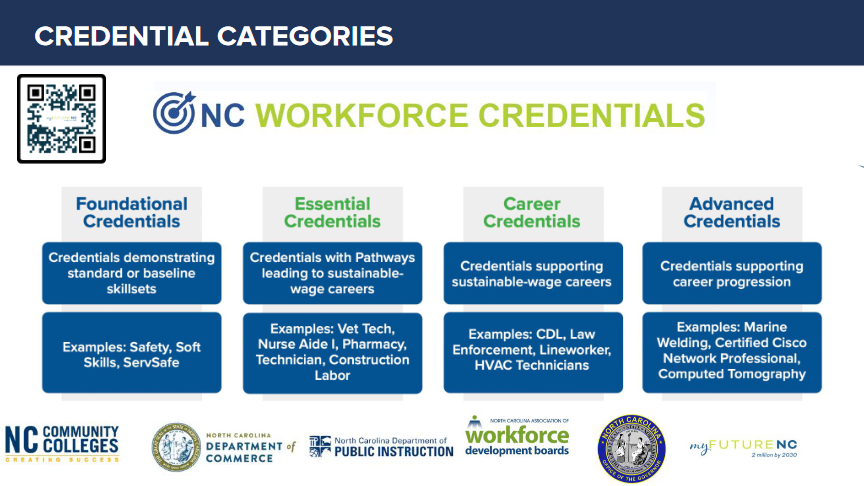
We developed a “localized” NC Workforce Credentials directory that shows training providers in the Land of Sky region who offer industry-valued credentials. This resource makes it easier for our region’s residents to find out where they can earn NC Workforce Credentials close to home. Users can filter the credentials by training provider and/or by the length of time required to earn the credential.
Promising Practices for Increasing Participation in and Completion of Industry-Valued Credentials
Reno Palombit, the CTE Director for Johnston County Public Schools, spoke first in the promising practices section of the webinar. Mr. Palombit began by showing a slide with the three-year trend for credential attainment by students in his district, and he gave context for the data. Next, he shared some of the improvement strategies that his district has used successfully. One notable strategy was to remove credentialing barriers. He gave several examples of what these barriers could be: not having enough exam prep materials, not having exam prep materials in students’ preferred languages (such as Spanish), and not having enough test proctors. Lastly, Mr. Palombit mentioned the importance of collaborating with local employers.
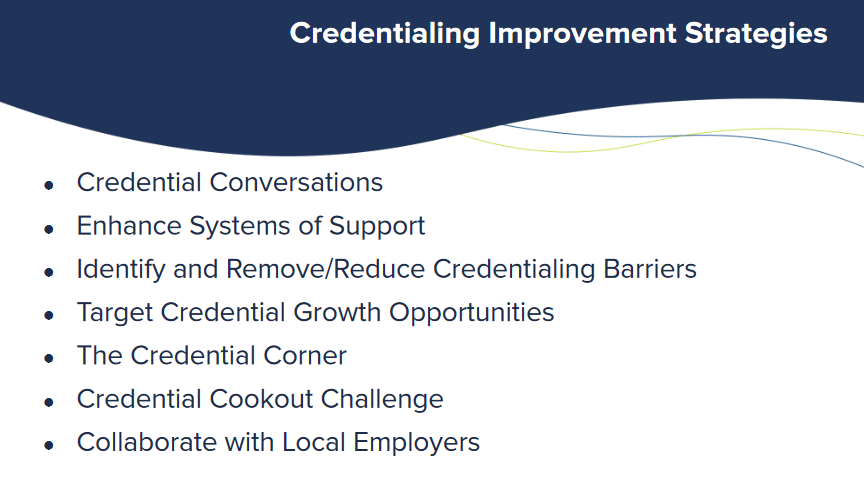
Stacey Gerard, Vice President for Continuing Education at Beaufort County Community College, spoke next about promising practices to increase credential attainment from a community college perspective. Throughout her short presentation, Dr. Gerard stressed the importance of stackable credentials with multiple on and off ramps for students, so that adult learners who are balancing education with work, family, and other responsibilities have maximum flexibility and accessibility with their educational opportunities. Her division’s theme embodies this idea:
We try to meet students where they are, and we take them as far as they want to go.
Some strategies that Beaufort County Community College uses to support this theme are bridge programs, credit for prior learning, parallel classes, and stackable credentials. Dr. Gerard emphasized the strong relationships that her college has with their local K-12 school system, especially the high schools, through the Career and College Promise (CCP) program that allows high school students to take college courses for both high school and college credit while they are also working toward finishing their high school diploma.
Connection to Our 2030 Goals for Educational & Workforce Attainment
The attainment of industry-valued credentials connects directly to our strategic goal for the workforce:

North Carolina’s CCP program, of which CTE is one pathway, provides opportunities for students to begin earning and even to complete credentials while still in high school. The phrase “employers’ needed competencies” in our strategic goal aligns with the definition of industry-valued credentials–competencies needed by employers can be demonstrated through the completion of employer-valued (i.e., industry-valued) credentials. Thus, North Carolina’s CCP program (and the CTE pathway specifically) connects directly to our efforts to ensure that 90% of adults in the labor force obtain credentials that are needed by our region’s employers.
We have two key performance indicators (KPIs) that track credential data, one that tracks credential completions directly (the number of students who graduate with a credential) and one that tracks credential participation (the percentage of students cross-enrolled during K-12). The chart for cross-enrollment shows data for our region’s two community colleges, each of which serves two of our counties. That chart provides both the overall numbers of CCP participation and also subdivides this data to show how many of those students were in each pathway.
Industry-Valued Credential Attainment Comparison by County per the 2024 Attainment Profiles
The chart below shows the percentage of CTE credentials completed that were industry-valued credentials according to the 2024 attainment profiles for each of our four counties. Henderson County had the highest rate (36%), followed by Madison County (29%), then Buncombe County (22%), and Transylvania County (20%). (Note that Buncombe County data includes both Asheville City Schools and Buncombe County Schools.)
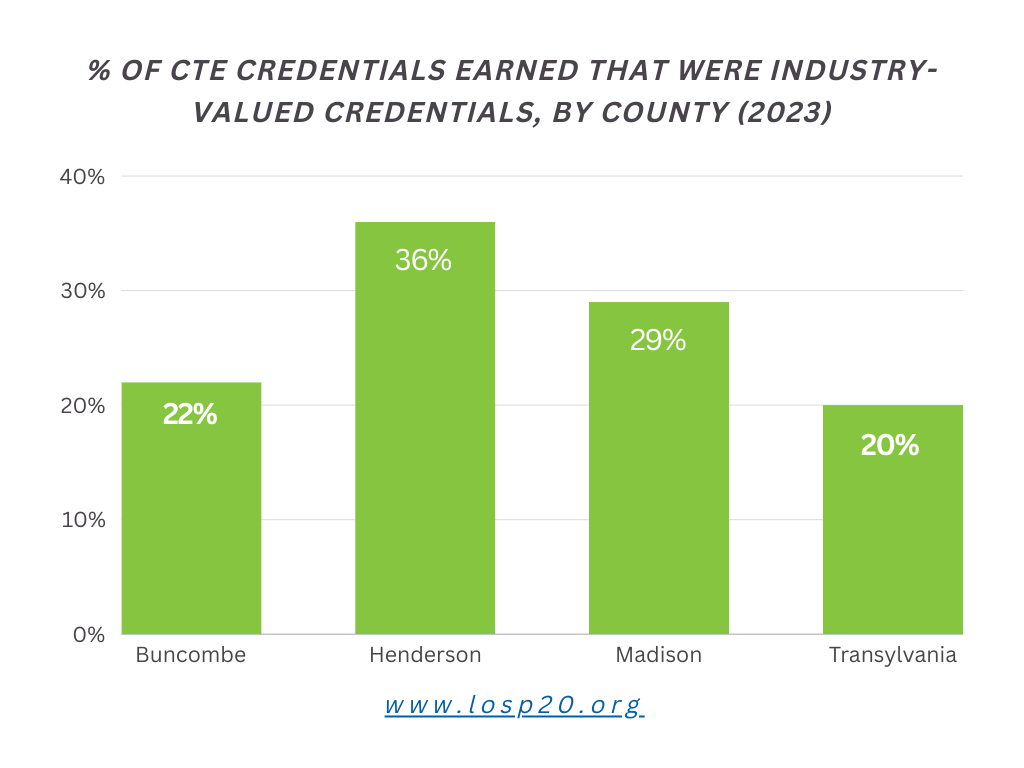
Detailed Industry-Valued Credential Data by County per the 2024 Attainment Profiles
Buncombe (suburban)
The 2024 attainment profile for Buncombe County states that students completed 1,534 CTE credentials, of which 343 (22%) were industry-valued credentials.
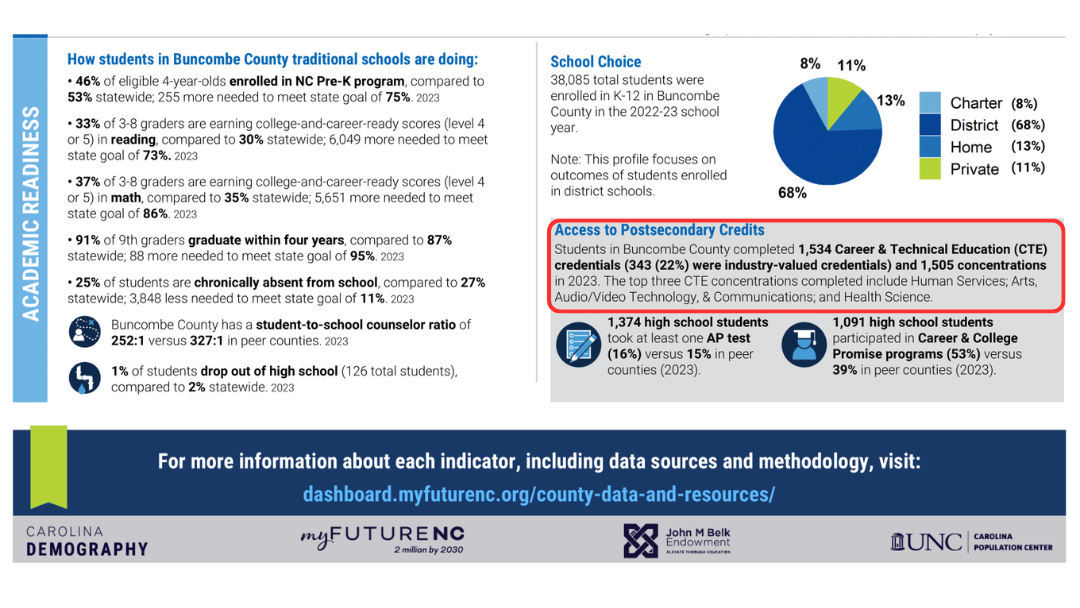
Henderson (suburban)
According to Henderson County’s 2024 attainment profile, students in the county completed 2,105 Career & Technical Education (CTE) credentials, of which 766 (36%) were industry-valued credentials.
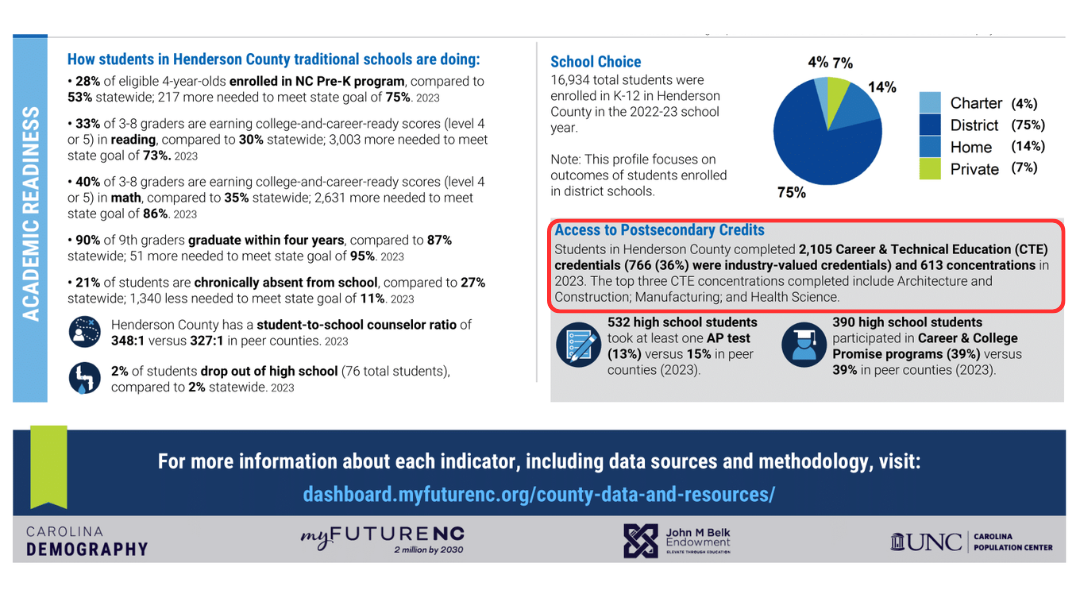
Madison (rural metro)
Madison County students completed 586 Career & Technical Education (CTE) credentials, and 171 (29%) of those were industry-valued credentials.
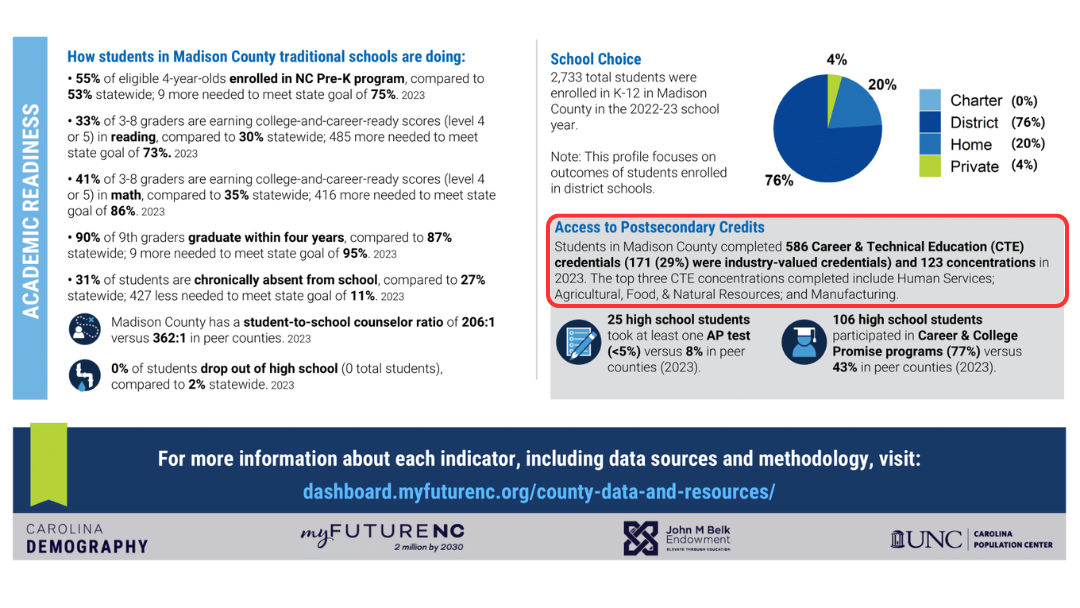
Transylvania (rural non-metro)
Transylvania County’s 2024 attainment profile indicates that 370 (20%) of the 1,884 Career & Technical Education (CTE) credentials completed by students in the district were industry-valued credentials.
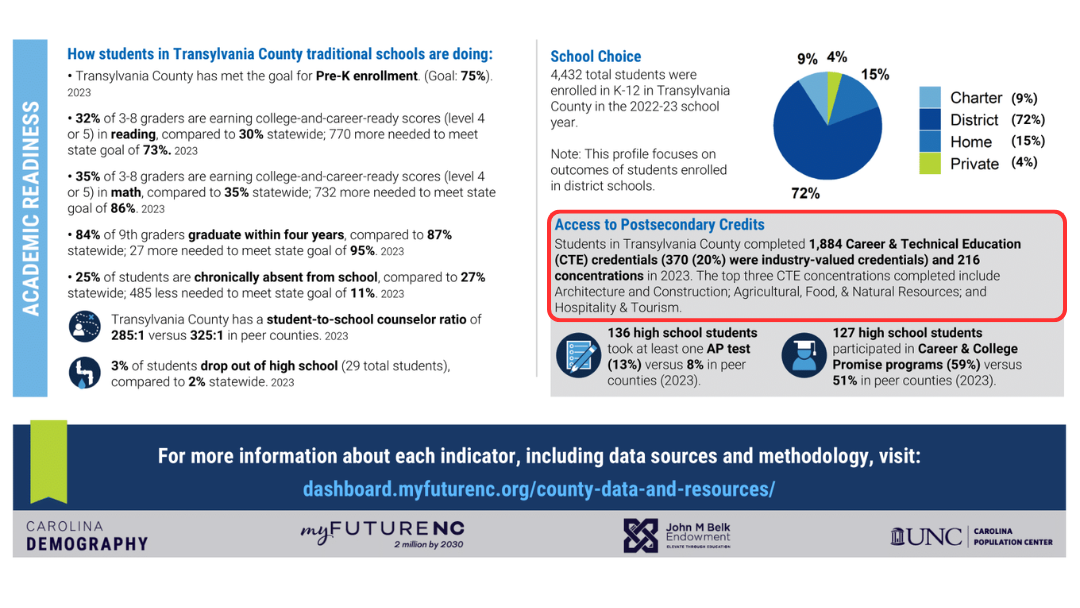
In summary, the numbers and percentages of CTE credentials earned that were industry-valued credentials, by county, were:
- Buncombe – 343 (22%)
- Henderson – 766 (36%)
- Madison – 171 (29%)
- Transylvania – 370 (20%)
Henderson County had both the highest number and highest percentage of industry-valued credentials earned by students, Madison County had the lowest number, and Transylvania County had the lowest percentage.
Land of Sky P20 Council's Efforts To Increase Industry-Valued Credential Participation and Completion
Initiatives
Project Collaborate
Through our partnerships with A-B Tech and Blue Ridge Community College in Project Collaborate, funded by a federal grant from the Department of Labor, we provide opportunities for students and workers to earn many different industry-valued credentials (both Essential and Career) in the Architecture & Construction and Manufacturing industries.
#worklocal
We have worked closely with CTE Directors from three counties in our region (Buncombe, Henderson, and Transylvania) on our #worklocal campaigns. Each campaign highlights local graduates who work at local employers in high-growth, high-demand industries to encourage local high school students to seek training and employment opportunities within growing career fields that align with the local labor market.
Policy Advocacy
We have policies in both the K-12 Education and Credentials & Workforce sections of our legislative agenda that pertain generally to industry-valued credentials because they address the Career and College Promise (CCP) program broadly. We also advocate for several associated strategies that apply to CCP, and by extension, to industry-valued credentials as well. One of our policy recommendations in the Credentials & Workforce section of our legislative agenda specifically addresses industry-valued credentials.
K-12 Education policy recommendation: Provide school districts with greater policy and legal flexibility to facilitate greater alignment to local and regional needs.
Strategies specific to CCP (and CTE):
- Revise legislation to allow schools to align their schedules with their local community college to enable students to participate fully in the Career and College Promise program and take tuition-free college courses while in high school.
Credentials & Workforce policy recommendation: Expand and strengthen coordination between K-12 and higher education to promote postsecondary pathways leading to recognized credentials leading to high-demand jobs with sustainable salaries and benefits.
Strategies specific to CCP (and CTE):
- Review all CCP operating requirements to make access to the high-school-to-community-college pipeline more accessible to all students in grades 9-12.
- Develop a web page identifying available pathways across NC.
- Hire a marketing firm to develop and roll out a CCP marketing campaign.
- Create a statewide data system for comprehensive credential measurements to ensure data pertaining to certifications, diplomas, and degrees is current and accessible for measuring progress to enable proactive decision-making at the state and local levels.
Credentials & Workforce policy recommendation: Expand and strengthen coordination between higher education and industry/employers to promote short-term and non-degree workforce training and pathways that lead to credentials aligned with in-demand, living-wage jobs.
Strategies specific to industry-valued credentials:
- Develop statewide advisory boards in each of the career fields for input to the State of NC and colleges regarding needed skills, certifications, licenses, and training/education required to build a strong NC workforce.
- Fund Curriculum Improvement Projects (CIPs) to use business /industry input to review and refine curricula at the NCCCS and UNC.
Resources
We provide contact information for our region’s CTE Directors and share this information with local employers to help grow and strengthen employer involvement in CTE. Employer communication about and input into industry-valued credentials is crucial.
As previously mentioned, we developed a “localized” NC Workforce Credentials directory that shows training providers in the Land of Sky region who offer industry-valued credentials.
We worked with the two community colleges in our region, Asheville-Buncombe Technical Community College (A-B Tech) and Blue Ridge Community College, to produce a series of short videos to help inform students and parents/guardians about the CCP program, which includes CTE. Video topics include What Is Career and College Promise (CCP)?, What Pathways Are Available in Career and College Promise (CCP)?, What Are Career and Technical Education (CTE) Pathways?, What Is a Cooperative Innovative High School (CIHS)?, and What Are Workforce Continuing Education (WCE) Pathways?


